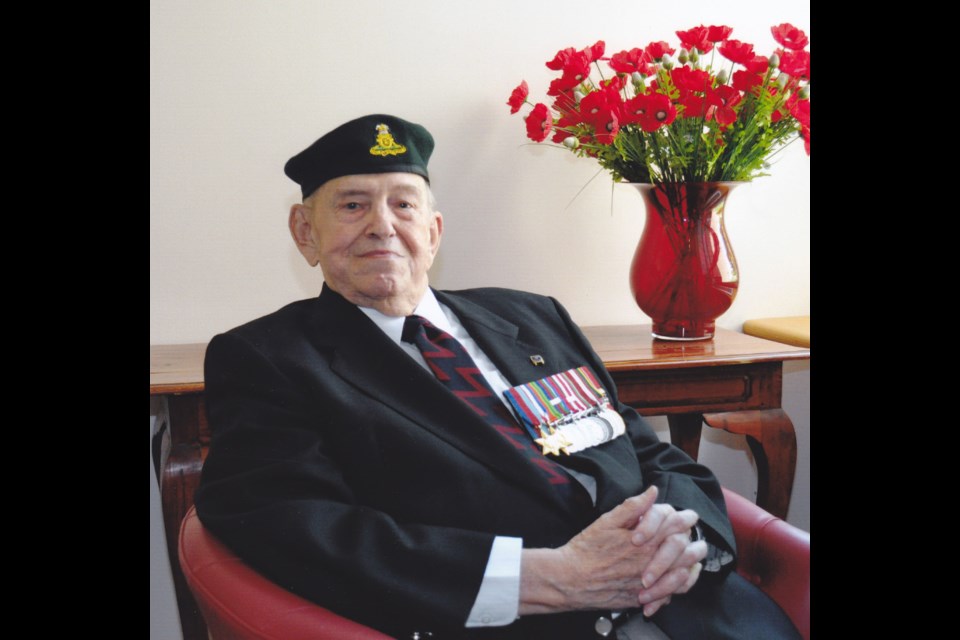As a boy, Fred Allen did not complete elementary school.
But that did not stop him from eventually returning to school and excelling in three fields.
Earlier this year, many Saultites taught by Allen when he was a math teacher at Sir James Dunn Collegiate extended their best wishes to him, through Facebook, when he celebrated his 95th birthday.
“He is normally a very stoic man, but he was very emotional when he saw all the comments on Facebook on his 95th birthday. His response was ‘I guess my life mattered after all,’” said his son Michael.
Fred Allen was born in Moose Jaw, Saskatchewan and raised in Fredericton, New Brunswick.
“We lived in the Depression, the 1930s, and there was very little hope for anyone where I was,” Allen said, saying he experienced struggles in school.
“They were dreadful times.”
Allen did not complete Grade 7.
“I found a job as a bellboy in a hotel in Fredericton. That was the only way to leave school, was to find a job.”
“There was no pay, no salary, all I got were tips, and they were very meagre tips.”
Allen made extra money at night from delivering merchandise for a Fredericton bootlegger.
“My first delivery was a shocker,” Allen told SooToday.
“When I went to the back door of the customer’s house, the light came on and there, standing in the doorway, was the teacher who was instrumental in getting me kicked out of school.”
“I’ll never forget her facial expression. She said ‘Freddie, Freddie, what are you doing?’ I said here are your ‘groceries.’”
“It was a brown paper bag full of booze.”
“The only advantage of being a bellboy was we got food and a uniform from the hotel.”
Allen joined the Canadian Army in 1938 and, after the Second World War broke out in Europe, he went overseas for six years, stationed in England for most of that time.
“There was a lot of training. Training, training, training. It drove us right up the wall but it had to be done.”
Allen finally saw action when he landed with his unit at Normandy three days after the June 6, 1944 Allied invasion of Europe, then moved through France, Belgium, the Netherlands and Germany.
“I received several medals but people have to realize the medals were awarded to units who achieved their objective. Who did it? We all did it,” Allen said.
Returning home to Canada, Allen was able to enter the University of New Brunswick as a mature student.
He studied history and political science and graduated in 1951.
“I wanted to study journalism but it wasn’t subsidized by the Department of National Defence,” Allen said.
He excelled at university, and upon graduation, was awarded a scholarship to study at the prestigious London School of Economics.
However, Allen could not follow through on that opportunity due to a prior military commitment.
As a result, Allen said “I became a career soldier.”
The rest of his military career included postings in Germany with NATO, in the U.S. working with Canada’s American allies, and a year-long assignment to a peacekeeping unit in Vietnam, from 1959 to 1960.
His unit’s mission there, with the help of troops from Italy and India, was to help maintain an uneasy peace between North and South Vietnam.
“We tried to ensure neither side didn’t build up their weapon supply, we had to check all the ports and all the railway stations to make sure they didn’t improve their military strength.”
“I’m very happy we didn’t get involved in fighting in Vietnam.”
Allen returned to Canada and was in charge of training cadets in southern Ontario.
“That was wonderful preparation for teaching,” said Allen, who left the forces with the rank of Captain in 1967.
He made his way north to the Sault, to become a math teacher at the Dunn.
“I enjoyed it very much. Math was the only subject I wanted to teach. The ‘new math’ held no terrors for me, but a lot of other teachers didn’t like it,” Allen recalled.
“I enjoyed being a teacher. I would do it all over again.”
Allen also worked hard on improving the teachers pension plan.
“I have a very specific memory (from his teaching days).”
“Because I had never been in high school, my first day in teaching, I met my Grade 9 class and I was honest with them and I said ‘you and I have a joint experience. This is your first day in high school, this is my first day in high school.’”
“But, it all went very well. I left some very happy students in the Sault.”
After retirement from teaching in the early 1980s, Allen dabbled in what he described as a third career.
“I always wanted to write.”
Allen has written four self-published novels, including ‘The First Snow of Winter,’ which has a military theme.
When his teaching days were over, Allen received an honorary secondary school diploma, then in 2002, an honorary elementary school diploma from his nephew, a Richmond Hill, Ontario school principal.
“In the family we call it his ‘backwards education.’ He graduated from university first in 1951, then ‘graduated,’ so to speak, from high school next, and ‘graduated’ from elementary school last,” Allen’s son Michael chuckled.
Allen is a father of three surviving children (another died in a glider crash), a grandfather and great-grandfather.
His wife Nell passed away in 2007, and he now resides at Toronto’s Sunnybrook Hospital Veterans Centre, near his son Michael’s home.
The centre, which Fred Allen describes as the best of its kind in Canada, is home to many surviving World War II veterans.
